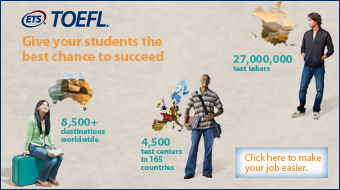
| IIE Home | Membership | Publications | Open Doors | Contact Us | Subscribe |
|
||
|
News
IIE led eight U.S. higher education representatives on a partnership-focused study tour to India last week to learn more about the Indian higher education system and explore potential partnership opportunities. The study tour was part of the International Academic Partnership Program focusing on India, a major initiative of IIE’s Center for International Partnerships in Higher Education, which seeks to foster sustainable partnerships between higher education institutions in the U.S. and India.
Read more about the study tour in the full press release. And read Clare Banks’ post in IIE’s Opening Minds blog about the benefits and challenges of building educational partnerships with Indian institutions.
A new paper compares the relative strengths of the United States and other countries in attracting top PhD talent. The study is based on survey data from scientists in 16 countries. Australia, Germany and Switzerland have made gains in recent years, relative to the United States in attracting PhD students, the study found. But researchers saw that American universities continue to be highly-regarded and benefit from the prestige of their academic programs. Read more at the Inside Higher Ed website.
Washington Post reporter Kevin Sullivan explains that the United States’ strict limits on visas for highly skilled workers, combined with limits that put these workers on waiting lists for many years and the absence of a special visa for young entrepreneurs, often discourage researchers staying in the United States and furthering their work. Sullivan says the situation is compounded because other countries are actively recruiting foreign-born U.S. graduates. Read the full article on the Washington Post website.
Social network analysis is a tool used in modern sociology to identify the links between individuals in various social systems. It is often used to measure program outcomes and impact. IIE’s Center for Academic Mobility Research has started to use these sort of analyses in its work. The Center’s Mirka Tvaruzkova suggests three ways to analyze the effectiveness of networks in IIE’s Opening Minds blog.
A new book published by the Institute of International Education with support from the AIFS Foundation, reviews the policies, institutions, and programs that have helped bring about major changes in higher education for Latin America.
Latin America’s New Knowledge Economy: Higher Education, Government, and International Collaboration chronicles the rapid economic growth and social changes that have taken place across the region in recent years, and examines these developments through the lens of higher education. In the book, leading scholars from Latin America and the U.S. explore factors that have been catalysts for higher education reforms such as increased access and equity, emphasis on international study, and investment by foreign universities and corporations.
Chapters include:
Latin America’s New Knowledge Economy is the seventh book in the Global Education Research Reports series from IIE and the AIFS Foundation. Previous books have examined higher education initiatives and exchanges in China, India, and the Middle East, as well as new developments in global mobility.
The books are available for purchase on the IIE Bookstore.
Conferences
February 28, 2013, 3:00- 5:00 p.m.
Commerce Chamber Theatre, Hong Kong
In a progressively borderless global economy and with the skills required for success in the workforce changing at a faster speed, it is imperative for companies not only to recruit and retain talent but to provide their employees with substantive, ongoing training and professional development. These changes are also taking place within the context of a rapidly changing higher education landscape, and it is important for education institutions and companies to work together to develop a skilled, dynamic and globally aware workforce.
Jonah Kokodyniak, IIE Deputy Vice President of Strategic Development will lead this seminar at the Greater Hong Kong Chamber of Commerce. He will discuss:
For more information, contact Eric Chan at eric@chamber.org.hk.
"Where do we stand, where are we heading?"
June 9-11 2013
The Hague, Netherlands
The Academic Cooperation Association’s annual conference bring together central actors and decision-makers in higher education such as rectors, vice-rectors, faculty and international relations staff, as well as policy-makers and practitioners from government departments, international institutions, non-governmental organizations and think tanks.
ACA’s 2Oth anniversary conference will celebrate the themes which were at the center of the Association’s interest at the time of foundation in 1993 and which always remained high on ACA’s agenda: internationalization and international mobility.
The two-day event will take place will include plenary sessions and interactive discussions, and will be preceded by a welcome reception and a social program on June 9. For more information, visit the ACA website.
Thursday, March 7
Providence College
This workshop will train participants to assess and improve programs they either operate or send students on by using the Standards with a specific focus on issues surrounding health and safety. The goal is to assist participants in developing custom protocols and procedures in accordance with Standard 8 of the Forum’s Standards of Good Practice for Education Abroad.
Facilitated by Natalie Mello, the Forum’s Executive Director of Member Services and Training, the workshop will include interactive exercises based on case studies. Participants will discuss different aspects of handling common health and safety concerns, and understand how the Standards of Good Practice support their own program management and goals.
Register at the Forum for Education Abroad's website, or visit the workshop page for more information.
March 7, 2013
2:00 - 3:15PM EST
The webinar will examine key issues regarding international student enrollment in the United States. Presenter Dr. Jenny Lee of the University of Arizona will present the latest research on the major academic and social challenges that international students encounter in the U.S. as well as findings from her own work on "neo-racism," discrimination against "foreigners" and the effects of such mistreatment on the future of international education. The webinar will also include suggested practices to improve international student success and implications for future recruitment.
Register using GotoMeeting.
Deadlines
"Internationalizing Higher Education: Strategic Approaches, Funding Formats and Best Practice Examples"
Application Deadline: March 1
On this study tour, scheduled for June 16 through June 22, some of Germany’s top institutions of higher education will present their internationalization strategies and initiatives, and they will outline best practice examples. Tour participants will visit universities in Berlin, Bremen and Braunschweig. Topics of focus include:
For further information, please visit the DAAD website or contact Uta Gaedeke at gaedeke@daad.org.
Application Deadline: March 6, 2013
The United States Agency for International Development (USAID) is offering two full-time Impact Evaluation and Research Fellowships under the Democracy Fellows and Grants Program (DFG), managed by the Institute of International Education (IIE) and funded by USAID’s Center of Excellence on Democracy, Human Rights, and Governance (DRG Center) in the Bureau for Democracy, Conflict, and Humanitarian Assistance (DCHA). Full-time Democracy Fellows are hired as salaried IIE staff with benefits.
With over $2 billion in USAID funding dedicated annually to programs to improve democracy, human rights, and governance in over 80 countries, there is a great need to invest in enhanced research to improve—and evaluation to assess—the effectiveness of these programs. The two Democracy Fellows will work with the DRG Center’s Learning Team to apply rigorous research methods to promote evidence-based design of, and modifications to, DRG programs. For more information about this position, please go to the program website.
USAID Democracy Fellows and Grants Program (DFG)
The DFG program is designed 1) to develop a pool of committed professionals at the junior, mid-, and senior levels; 2) to strengthen relations between USAID and academic, think tank, and research organizations; and 3) to promote research and innovative solutions to DRG programs.
The program will offer two types of opportunities to engage experts, students, and academic institutions in supporting USAID programming and policy: 1) fellowships to junior, mid-level, and senior DRG professionals and 2) grants to academic or research institutions working in the DRG fields (still under development, with more information available on the DFG site in the near future).
Application deadline: March 31, 2013
The Master of Arts in American Studies (MAS) is an interdisciplinary program taught in English and aimed at qualified graduate students from around the world. It offers inside knowledge of the United States from an outside perspective. Admission is competitive and depends on quality and academic merits of the candidates. MAS participants benefit both from excellent academic teaching by internationally renowned scholars and from an interdisciplinary approach which meets the needs of future leaders.
The MAS is a three semester program, with a performance-related, two-semester fast track option available. Further information visit the Heidelberg Center for American Studies web page, or the Masters program web page.
Fulbright
Application Deadline: August 1, 2013
The Fulbright Scholar Program offers teaching, research or combination teaching/research awards in over 125 countries for the 2014-2015 academic year. Opportunities are available for college and university faculty and administrators as well as for professionals, artists, journalists, scientists, lawyers, independent scholars and many others. In order to meet the changing needs of academia and develop new options to better accommodate the interests and commitments of today’s scholars, the program has introduced several innovations to the 2014-2015 program.
Interested faculty and professionals are encouraged to learn more about these opportunities, and hundreds of others, by visiting the Catalog of Awards. The application deadline for most awards, including the ones listed below, is August 1, 2013. U.S. citizenship is required. For other eligibility requirements and detailed award descriptions visit the website.
In an effort to engage U.S. scholars currently unable to spend extended periods of time abroad, the Fulbright Program welcomes applications from scholars who propose multiple stays of one to three months in the host country over a period of two to three years. Fulbright Flex grants are particularly suitable for scholars who require longer than one year to accomplish their work or who cannot be away from their home institutions for a single, lengthy period.
For more information, please visit the Flex Awards page.
The Fulbright Scholar Program offers new options for postdoctoral and early career academics to jumpstart their careers with a program that is internationally recognized for excellence. Fulbright postdoctoral awards, available in a range of countries and fields, are open to U.S. scholars who have recently completed their doctoral degrees – typically within the five previous years. These awards present an excellent opportunity for recently minted scholars to deepen their expertise, to acquire new skills, to work with additional resources and to make connections with others in their fields.
Visit the Fulbright Postdoctoral/Early Career Grants page for more information.
Following a review of grant benefits, the Fulbright U.S. Scholar Program intends to introduce a new model in 2014-2015. Scholars on teaching or teaching/research grants may be eligible to receive a salary supplement stipend to bring the amount to the same level as the individual’s salary. Certain exclusions may apply. For more information, please visit the website.
Opportunities for scholars specializing in Teaching English as a Foreign Language (TEFL) and associated fields are showcased in an entirely new way by the Fulbright Scholar Program. By presenting the full range of TEFL within a worldwide context, potential applicants will be able to examine more than 50 different programs simultaneously, basing their choice of country programs in comparison to any others for which they qualify. Applicants are invited to include as many as three different country preferences, choose a world area or select "open to any placement." Please see the TEFL page for more information. |
| www.iie.org/iienetwork • Member website of the Institute of International Education © 2025 Institute of International Education. All rights reserved. |



